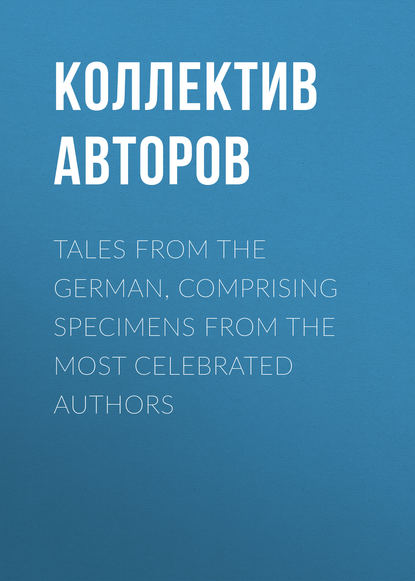По всем вопросам обращайтесь на: info@litportal.ru
(©) 2003-2024.
✖
Tales from the German, Comprising specimens from the most celebrated authors
Настройки чтения
Размер шрифта
Высота строк
Поля
"Then the heart also is buried?" asked Peter, anxiously.
"To be sure that also is buried."
"But supposing one has no longer a heart?" continued Peter.
Hezekiel gave him a terrible look at these words. "What do you mean by that? Do you wish to rally me? Think you I have no heart?"
"Oh, heart enough, as firm as stone," replied Peter.
Hezekiel looked in astonishment at him, glancing round at the same time to see whether they were overheard, and then said, "Whence do you know that? Or does your own perhaps no longer beat within your breast?"
"It beats no longer, at least, not in my breast;" replied Peter Munk. "But tell me, as you know what I mean, how will it be with our hearts?"
"Why does that concern you, my good fellow?" answered Hezekiel, laughing. "Why you have plenty here upon earth, and that is sufficient. Indeed, the comfort of our cold hearts is that no fear at such thoughts befals us."
"Very true, but still one cannot help thinking of it, and though I know no fear now, still I well remember how I was terrified at hell when yet an innocent little boy."
"Well, it will not exactly go well with us," said Hezekiel; "I once asked a schoolmaster about it, who told me that the hearts are weighed after death to ascertain the weight of their sins. The light ones rise, the heavy sink, and methinks our stone hearts will weigh heavy enough."
"Alas, true," replied Peter; "I often feel uncomfortable that my heart is so devoid of sympathy, and so indifferent when I think of such things." So ended their conversation.
But the following night Peter again heard the well-known voice whispering into his ear five or six times, "Peter, get a warmer heart!" He felt no repentance at having killed his wife, but when he told the servants that she had gone on a journey, he always thought within himself, where is she gone to? Six days had thus passed away, and he still heard the voice at night, and still thought of the sylvan spirit and his terrible menace; but on the seventh morning, he jumped up from his couch and cried, "Well, then, I will see whether I can get a warmer heart, for the cold stone in my breast makes my life only tedious and desolate." He quickly put on his best dress, mounted his horse, and rode towards the Tannenbühl.
Having arrived at that part where the trees stand thickest, he dismounted, and went with a quick pace towards the summit of the hill, and as he stood before the thick pine he repeated the following verse:
"Keeper of wealth in the forest of pine,
Hundreds of years are surely thine:
Thine is the tall pine's dwelling place —
Those born on Sunday see thy face."
The glass-mannikin appeared, not looking friendly and kindly as formerly, but gloomy and sad; he wore a little coat of black glass, and a long glass crape hung floating from his hat, and Peter well knew for whom he mourned.
"What do you want with me, Peter Munk?" asked he with a stern voice.
"I have one more wish, Mr. Schatzhauser," replied Peter, with his look cast down.
"Can hearts of stone still wish?" said the former. "You have all your corrupt mind can need, and I could scarcely fulfil your wish."
"But you have promised to grant me three wishes, and one I have still left."
"I can refuse it if it is foolish," continued the spirit; "but come, let me hear what you wish."
"Well, take the dead stone out of me, and give me a living heart," said Peter.
"Have I made the bargain about the heart with you?" asked the glass-mannikin. "Am I the Dutch Michel, who gives wealth and cold hearts? It is of him you must seek to regain your heart."
"Alas! he will never give it back," said Peter.
"Bad as you are, yet I feel pity for you," continued the little man, after some consideration; "and as your wish is not foolish, I cannot at least refuse my help. Hear then. You can never recover your heart by force, only by stratagem, but probably you will find it without difficulty; for Michel will ever be stupid Michel, although he fancies himself very shrewd. Go straightway to him, and do as I tell you." He now instructed Peter fully, and gave him a small cross of pure glass, saying, "He cannot touch your life and will let you go when you hold this before him and repeat a prayer. When you have obtained your wish return to me."
Peter took the cross, impressed all his words on his memory, and started on his way to the Dutchman Michel's residence; there he called his name three times and immediately the giant stood before him.
"You have slain your wife?" he asked, with a grim laugh. "I should have done the same, she wasted your property on beggars; but you will be obliged to leave the country for some time; and I suppose you want money and have come to get it?"
"You have hit it," replied Peter; "and pray let it be a large sum, for it is a long way to America."
Michel leading the way they went into his cottage; there he opened a chest containing much money and took out whole rolls of gold. While he was counting it on the table Peter said, "You're a wag, Michel. You have told me a fib, saying that I had a stone in my breast, and that you had my heart."
"And is it not so then?" asked Michel, astonished. "Do you feel your heart? Is it not cold as ice? Have you any fear or sorrow? Do you repent of any thing?"
"You have only made my heart to cease beating, but I still have it in my breast, and so has Hezekiel, who told me you had deceived us both. You are not the man who, unperceived and without danger, could tear the heart from the breast; it would require witchcraft on your part."
"But I assure you," cried Michel, angrily, "you and Hezekiel and all the rich people, who have sold themselves to me, have hearts as cold as yours, and their real hearts I have here in my chamber."
"Ah! how glibly you can tell lies," said Peter, laughing, "you must tell that to another to be believed; think you I have not seen such tricks by dozens in my journeys? Your hearts in the chamber are made of wax; you're a rich fellow I grant, but you are no magician."
Now the giant was enraged and burst open the chamber door, saying, "Come in and read all the labels and look yonder is Peter Munk's heart; do you see how it writhes? Can that too be of wax?"
"For all that, it is of wax," replied Peter. "A genuine heart does not writhe like that. I have mine still in my breast. No! you are no magician."
"But I will prove it to you," cried the former angrily. "You shall feel that it is your heart." He took it, opened Peter's waistcoat, took the stone from his breast, and held it up. Then taking the heart, he breathed on it, and set it carefully in its proper place, and immediately Peter felt how it beat, and could rejoice again. "How do you feel now?" asked Michel, smiling.
"True enough, you were right," replied Peter, taking carefully the little cross from his pocket. "I should never have believed such things could be done."
"You see I know something of witchcraft, do I not? But, come, I will now replace the stone again."
"Gently, Herr Michel," cried Peter, stepping backwards, and holding up the cross, "mice are caught with bacon, and this time you have been deceived;" and immediately he began to repeat the prayers that came into his mind.
Now Michel became less and less, fell to the ground, and writhed like a worm, groaning and moaning, and all the hearts round began to beat, and became convulsed, so that it sounded like a clockmaker's workshop.
Peter was terrified, his mind was quite disturbed; he ran from the house, and, urged by the anguish of the moment, climbed up a steep rock, for he heard Michel get up, stamping and raving, and denouncing curses on him. When he reached the top, he ran towards the Tannenbühl; a dreadful thunder-storm came on; lightning flashed around him, splitting the trees, but he reached the precincts of the glass-mannikin in safety.
His heart beat joyfully – only because it did beat; but now he looked back with horror on his past life, as he did on the thunderstorm that was destroying the beautiful forest on his right and left. He thought of his wife, a beautiful, good woman, whom he had murdered from avarice; he appeared to himself an outcast from mankind, and wept bitterly as he reached the hill of the glass-mannikin.
The Schatzhauser was sitting under a pine-tree, and was smoking a small pipe; but he looked more serene than before.
"Why do you weep, Peter?" asked he, "have you not recovered your heart? Is the cold one still in your breast?"
"Alas! sir," sighed Peter, "when I still carried about with me the cold stony heart, I never wept, my eyes were as dry as the ground in July; but now my old heart will almost break with what have done. I have driven my debtors to misery, set the dogs on the sick and poor, and you yourself know how my whip fell upon her beautiful forehead."
"Peter, you were a great sinner," said the little man. "Money and idleness corrupted you, until your heart turned to stone, and no longer knew joy, sorrow, repentance, or compassion. But repentance reconciles; and if I only knew that you were truly sorry for your past life, it might yet be in my power to do something for you."
"I wish nothing more," replied Peter, dropping his head sorrowfully. "It is all over with me, I can no more rejoice in my lifetime; what shall I do thus alone in the world? My mother will never pardon me for what I have done to her, and I have perhaps brought her to the grave, monster that I am! Elizabeth, my wife, too, – rather strike me dead, Herr Schatzhauser, then my wretched life will end at once."
"Well," replied the little man, "if you wish nothing else, you can have it, so my axe is at hand." He quietly took his pipe from his mouth, knocked the ashes out, and put it into his pocket. Then rising slowly, he went behind the pines. But Peter sat down weeping in the grass, his life had no longer any value for him, and he patiently awaited the deadly blow. After a short time, he heard gentle steps behind him, and thought, "Now he is coming."
"Look up once more, Peter Munk," cried the little man. He wiped the tears from his eyes and looked up, and beheld his mother, and Elizabeth his wife, who kindly gazed on him. Then he jumped up joyfully, saying, "You are not dead, then, Elizabeth, nor you, mother; and have you forgiven me?"
"They will forgive you," said the glass-mannikin, "because you feel true repentance, and all shall be forgotten. Go home now, to your father's hut, and be a charcoal-burner as before; if you are active and honest, you will do credit to your trade, and your neighbours will love and esteem you more than if you possessed ten tons of gold." Thus saying, the glass-mannikin left them. The three praised and blessed him, and went home.
"To be sure that also is buried."
"But supposing one has no longer a heart?" continued Peter.
Hezekiel gave him a terrible look at these words. "What do you mean by that? Do you wish to rally me? Think you I have no heart?"
"Oh, heart enough, as firm as stone," replied Peter.
Hezekiel looked in astonishment at him, glancing round at the same time to see whether they were overheard, and then said, "Whence do you know that? Or does your own perhaps no longer beat within your breast?"
"It beats no longer, at least, not in my breast;" replied Peter Munk. "But tell me, as you know what I mean, how will it be with our hearts?"
"Why does that concern you, my good fellow?" answered Hezekiel, laughing. "Why you have plenty here upon earth, and that is sufficient. Indeed, the comfort of our cold hearts is that no fear at such thoughts befals us."
"Very true, but still one cannot help thinking of it, and though I know no fear now, still I well remember how I was terrified at hell when yet an innocent little boy."
"Well, it will not exactly go well with us," said Hezekiel; "I once asked a schoolmaster about it, who told me that the hearts are weighed after death to ascertain the weight of their sins. The light ones rise, the heavy sink, and methinks our stone hearts will weigh heavy enough."
"Alas, true," replied Peter; "I often feel uncomfortable that my heart is so devoid of sympathy, and so indifferent when I think of such things." So ended their conversation.
But the following night Peter again heard the well-known voice whispering into his ear five or six times, "Peter, get a warmer heart!" He felt no repentance at having killed his wife, but when he told the servants that she had gone on a journey, he always thought within himself, where is she gone to? Six days had thus passed away, and he still heard the voice at night, and still thought of the sylvan spirit and his terrible menace; but on the seventh morning, he jumped up from his couch and cried, "Well, then, I will see whether I can get a warmer heart, for the cold stone in my breast makes my life only tedious and desolate." He quickly put on his best dress, mounted his horse, and rode towards the Tannenbühl.
Having arrived at that part where the trees stand thickest, he dismounted, and went with a quick pace towards the summit of the hill, and as he stood before the thick pine he repeated the following verse:
"Keeper of wealth in the forest of pine,
Hundreds of years are surely thine:
Thine is the tall pine's dwelling place —
Those born on Sunday see thy face."
The glass-mannikin appeared, not looking friendly and kindly as formerly, but gloomy and sad; he wore a little coat of black glass, and a long glass crape hung floating from his hat, and Peter well knew for whom he mourned.
"What do you want with me, Peter Munk?" asked he with a stern voice.
"I have one more wish, Mr. Schatzhauser," replied Peter, with his look cast down.
"Can hearts of stone still wish?" said the former. "You have all your corrupt mind can need, and I could scarcely fulfil your wish."
"But you have promised to grant me three wishes, and one I have still left."
"I can refuse it if it is foolish," continued the spirit; "but come, let me hear what you wish."
"Well, take the dead stone out of me, and give me a living heart," said Peter.
"Have I made the bargain about the heart with you?" asked the glass-mannikin. "Am I the Dutch Michel, who gives wealth and cold hearts? It is of him you must seek to regain your heart."
"Alas! he will never give it back," said Peter.
"Bad as you are, yet I feel pity for you," continued the little man, after some consideration; "and as your wish is not foolish, I cannot at least refuse my help. Hear then. You can never recover your heart by force, only by stratagem, but probably you will find it without difficulty; for Michel will ever be stupid Michel, although he fancies himself very shrewd. Go straightway to him, and do as I tell you." He now instructed Peter fully, and gave him a small cross of pure glass, saying, "He cannot touch your life and will let you go when you hold this before him and repeat a prayer. When you have obtained your wish return to me."
Peter took the cross, impressed all his words on his memory, and started on his way to the Dutchman Michel's residence; there he called his name three times and immediately the giant stood before him.
"You have slain your wife?" he asked, with a grim laugh. "I should have done the same, she wasted your property on beggars; but you will be obliged to leave the country for some time; and I suppose you want money and have come to get it?"
"You have hit it," replied Peter; "and pray let it be a large sum, for it is a long way to America."
Michel leading the way they went into his cottage; there he opened a chest containing much money and took out whole rolls of gold. While he was counting it on the table Peter said, "You're a wag, Michel. You have told me a fib, saying that I had a stone in my breast, and that you had my heart."
"And is it not so then?" asked Michel, astonished. "Do you feel your heart? Is it not cold as ice? Have you any fear or sorrow? Do you repent of any thing?"
"You have only made my heart to cease beating, but I still have it in my breast, and so has Hezekiel, who told me you had deceived us both. You are not the man who, unperceived and without danger, could tear the heart from the breast; it would require witchcraft on your part."
"But I assure you," cried Michel, angrily, "you and Hezekiel and all the rich people, who have sold themselves to me, have hearts as cold as yours, and their real hearts I have here in my chamber."
"Ah! how glibly you can tell lies," said Peter, laughing, "you must tell that to another to be believed; think you I have not seen such tricks by dozens in my journeys? Your hearts in the chamber are made of wax; you're a rich fellow I grant, but you are no magician."
Now the giant was enraged and burst open the chamber door, saying, "Come in and read all the labels and look yonder is Peter Munk's heart; do you see how it writhes? Can that too be of wax?"
"For all that, it is of wax," replied Peter. "A genuine heart does not writhe like that. I have mine still in my breast. No! you are no magician."
"But I will prove it to you," cried the former angrily. "You shall feel that it is your heart." He took it, opened Peter's waistcoat, took the stone from his breast, and held it up. Then taking the heart, he breathed on it, and set it carefully in its proper place, and immediately Peter felt how it beat, and could rejoice again. "How do you feel now?" asked Michel, smiling.
"True enough, you were right," replied Peter, taking carefully the little cross from his pocket. "I should never have believed such things could be done."
"You see I know something of witchcraft, do I not? But, come, I will now replace the stone again."
"Gently, Herr Michel," cried Peter, stepping backwards, and holding up the cross, "mice are caught with bacon, and this time you have been deceived;" and immediately he began to repeat the prayers that came into his mind.
Now Michel became less and less, fell to the ground, and writhed like a worm, groaning and moaning, and all the hearts round began to beat, and became convulsed, so that it sounded like a clockmaker's workshop.
Peter was terrified, his mind was quite disturbed; he ran from the house, and, urged by the anguish of the moment, climbed up a steep rock, for he heard Michel get up, stamping and raving, and denouncing curses on him. When he reached the top, he ran towards the Tannenbühl; a dreadful thunder-storm came on; lightning flashed around him, splitting the trees, but he reached the precincts of the glass-mannikin in safety.
His heart beat joyfully – only because it did beat; but now he looked back with horror on his past life, as he did on the thunderstorm that was destroying the beautiful forest on his right and left. He thought of his wife, a beautiful, good woman, whom he had murdered from avarice; he appeared to himself an outcast from mankind, and wept bitterly as he reached the hill of the glass-mannikin.
The Schatzhauser was sitting under a pine-tree, and was smoking a small pipe; but he looked more serene than before.
"Why do you weep, Peter?" asked he, "have you not recovered your heart? Is the cold one still in your breast?"
"Alas! sir," sighed Peter, "when I still carried about with me the cold stony heart, I never wept, my eyes were as dry as the ground in July; but now my old heart will almost break with what have done. I have driven my debtors to misery, set the dogs on the sick and poor, and you yourself know how my whip fell upon her beautiful forehead."
"Peter, you were a great sinner," said the little man. "Money and idleness corrupted you, until your heart turned to stone, and no longer knew joy, sorrow, repentance, or compassion. But repentance reconciles; and if I only knew that you were truly sorry for your past life, it might yet be in my power to do something for you."
"I wish nothing more," replied Peter, dropping his head sorrowfully. "It is all over with me, I can no more rejoice in my lifetime; what shall I do thus alone in the world? My mother will never pardon me for what I have done to her, and I have perhaps brought her to the grave, monster that I am! Elizabeth, my wife, too, – rather strike me dead, Herr Schatzhauser, then my wretched life will end at once."
"Well," replied the little man, "if you wish nothing else, you can have it, so my axe is at hand." He quietly took his pipe from his mouth, knocked the ashes out, and put it into his pocket. Then rising slowly, he went behind the pines. But Peter sat down weeping in the grass, his life had no longer any value for him, and he patiently awaited the deadly blow. After a short time, he heard gentle steps behind him, and thought, "Now he is coming."
"Look up once more, Peter Munk," cried the little man. He wiped the tears from his eyes and looked up, and beheld his mother, and Elizabeth his wife, who kindly gazed on him. Then he jumped up joyfully, saying, "You are not dead, then, Elizabeth, nor you, mother; and have you forgiven me?"
"They will forgive you," said the glass-mannikin, "because you feel true repentance, and all shall be forgotten. Go home now, to your father's hut, and be a charcoal-burner as before; if you are active and honest, you will do credit to your trade, and your neighbours will love and esteem you more than if you possessed ten tons of gold." Thus saying, the glass-mannikin left them. The three praised and blessed him, and went home.

















